#i find that it actually gave me different interpretation of the scene??
Explore tagged Tumblr posts
Text
I read Death and the Compass original short story in English and Spanish.... I guess the movie adaptation was pretty good? It stayed pretty much true to the story.
Only that the original was more compact... And the journalist part was different.
Treviranus did not whine as much either.... Honestly the weak part of the film. Shouldn't have added it lol.
Red Scharlach became much more interesting in the film though.
Also yeah I now got why the movie felt too long, because the original story was so short... It felt like it was trying a bit too hard to extend it.
#death and the compass#also Lonro's mansplain was a bit different at the end...#i find that it actually gave me different interpretation of the scene??#i meant lonnrot...
5 notes
·
View notes
Text
Was not expecting a Yuri/Yor chapter, but it was a pleasant surprise! First thing I want to mention is the fact that Yor is not wearing her usual Thorn Princess earrings, but instead has rose earrings similar to the button on her red blouse.
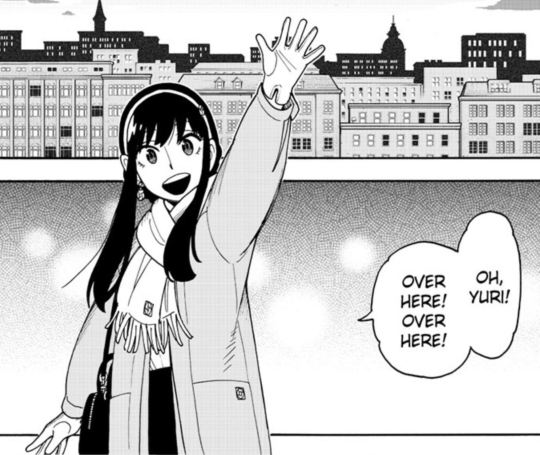
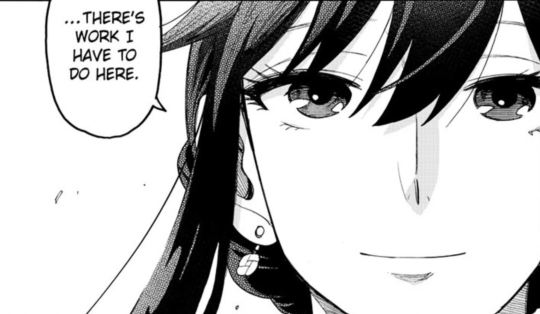
I could be wrong, but I believe this is the first time we've seen her with different earrings. Perhaps it's an indication that she's feeling more "at ease" as far as her relationship with her Thorn Princess identity, since we know that her usual earrings function as weapons if needed. Maybe she doesn't feel as much of a need to be "on guard" all the time as she used to be.
As for the bulk of this chapter, it featured great character development for the Briar siblings. What stood out to me the most is how hard it is for Yuri to understand that Yor's happiness truly does come from the happiness of others, plus the fact that she has very few desires for herself, especially materialistic ones that can be bought at a store. It's hard for him to grasp because he spent his whole life watching her selflessly sacrifice her own childhood to take care of the both of them, so he feels he has to overcompensate. But again, because he can't fathom that she actually enjoys taking care of others, the only explanation he can come up with for her lack of wanting things for herself is that the Forgers are "controlling" her somehow (also due to his own bias, lol).
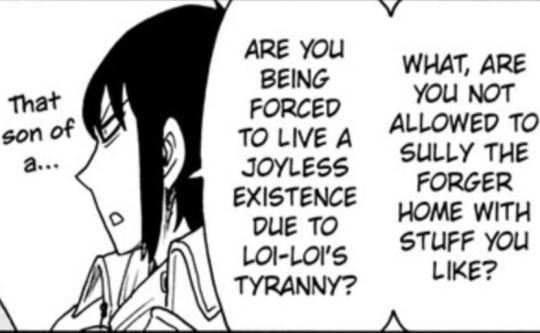
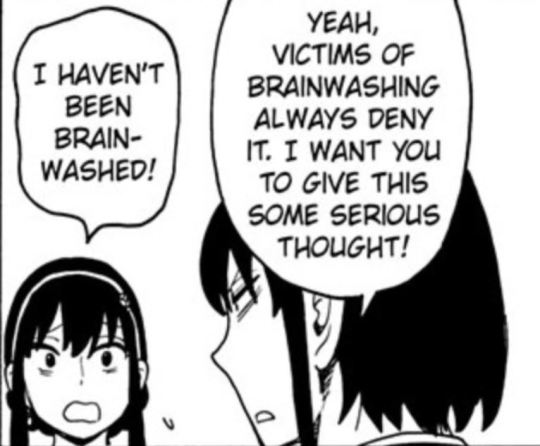
It was amusing how Yuri's attempts to frame Loid and Anya as "brainwashing" Yor failed miserably...it only served to highlight how much she cares about them, especially Anya. I loved the below panel ❤️ She's such a mom.
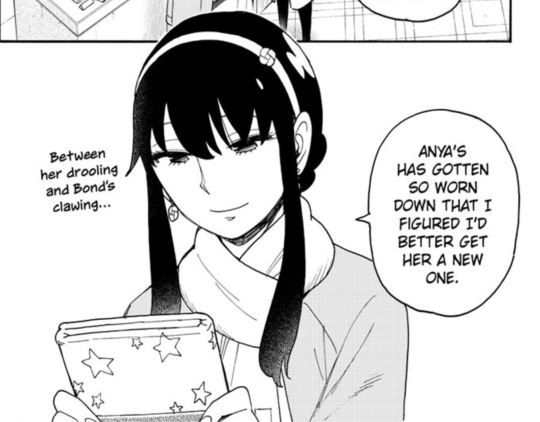
By the way, this next panel cracked me up the most 🤣 I was curious what the "go at it" part was in the Japanese version, and it turns out to be the verb 絡む ("karamu"). It has several meanings, but mainly it means "to be entangled with" either with physical things like vines or wires, but also to be entangled with a person in a problematic way, such as by quarreling. I can only imagine how Yuri interpreted this 😂
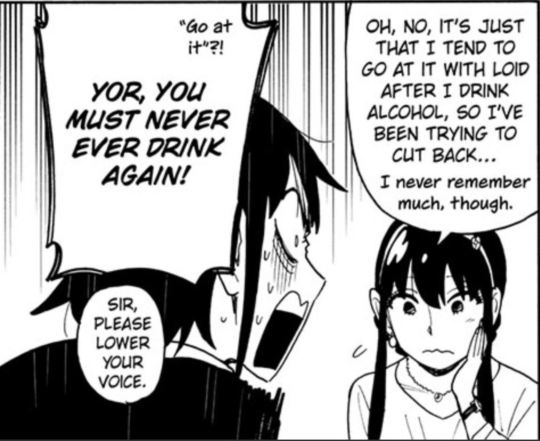
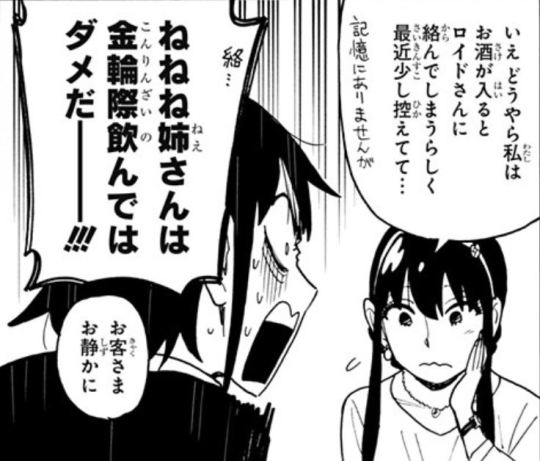
In the latter part of the chapter, Yor finally made it clear to Yuri that he doesn't need to keep pitying her. She states that she enjoyed the time she spent taking care of him, and whatever negative feelings she had after he left her are in the past, so he doesn't have to keep trying to compensate for it.
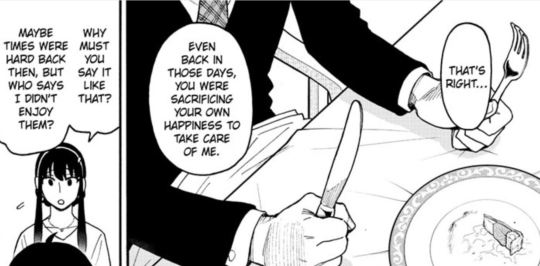
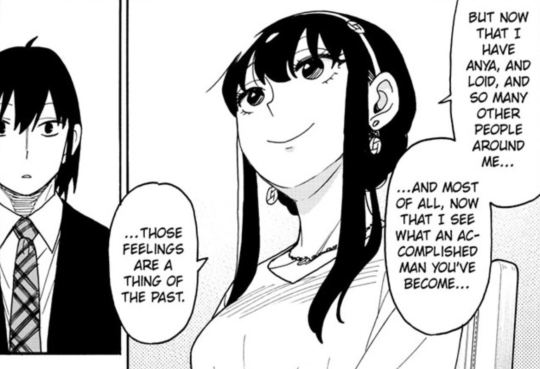
For a brief moment, Yuri daydreams about the two of them going back to their hometown to live peaceful lives before ultimately realizing that they have responsibilities in the city that they can't just abandon. The emphasis on their respective "real" jobs that they can't reveal to each other, plus the later scene of Yuri lamenting that he feels distant from Yor because he can't show her who he's really become, definitely gave me a feeling of foreboding. Plus the fact that the chapter ends with him possibly being assigned a new job.

Even though the rest of the Forgers didn't appear in this chapter, we did get this precious little panel when Yuri was musing about why he feels so lonely. So thank you for this Yuri and your rolodex wheel of anxious thoughts 😂
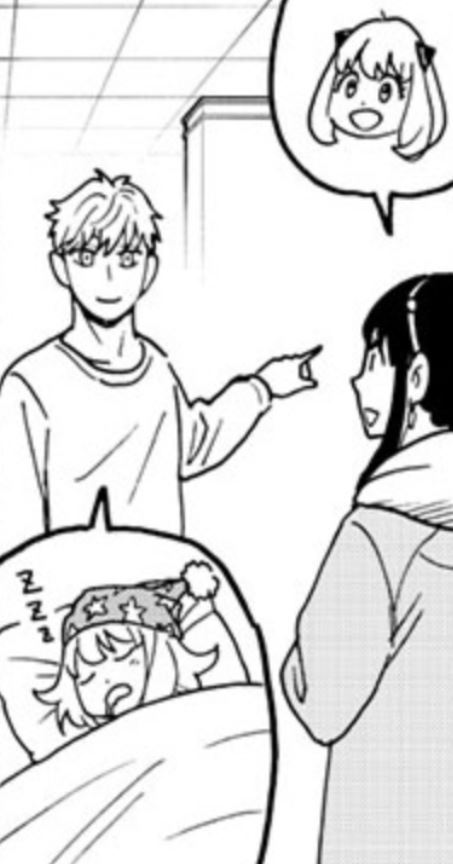
I think it's still too soon for any kind of big, story-shattering reveal, but I feel like Yuri's next assignment could be something akin to the mole hunt arc, where something big almost happens...the fandom focuses a lot on a Twilight/Thorn Princess reveal, but a Briar sibling reveal would be just as major in my opinion, which is the vibe I got from this chapter. Since Yuri already had an encounter with Twilight, what if he had some kind of run-in with Garden next? 👀
...or maybe this was just a standalone chapter and we'll never find out what Yuri's next assignment is because it's not important and the next chapter will move on to something else 😅 I'd say it's 50/50 at this point, lol.
#spy x family#sxf#spy family#spyxfamily#yor forger#yuri briar#sxf spoilers#sxf manga#sxf manga spoilers
573 notes
·
View notes
Text
Just some more Dune Part 2 things that I thought were interesting with a specific focus on Feyd-Rautha:
- just… the way that he’s so very accurately portrayed as a psychopath adds a level of grit I didn’t get reading when the book
- the scenes with him and Lady Fenring got me good. The book mentions that he finds her attractive, definitely echoed in the movie. There weren’t explicitly written scenes in the book of how Lady Fenring slept with him (but this was confirmed through dialogue), so I liked the movie’s interpretation of her luring him using her Bene Gesserit abilities
- I would have liked to see Feyd-Rautha tested by the Gom Jabbar the same way Paul was. In the book (and I think part 1 of the movie?) it’s specified that Paul has endured the most amount of pain anyone can handle from the test, but given that movie Feyd-Rautha seems canonically a sadist + masochist, I wonder how long he would have lasted?
- overall the vibe and aesthetic of the Harkonnen’s was terrifying and great. The black and white visuals, dimly lit rooms, flashing lights… There are a lot of different villains in Dune, especially in Part 2 — The Emperor, Jessica — but the most clear-cut ones by far are the Harkonnens. I think the visuals definitely amplify that. I find it rather interesting that the Harkonnens are portrayed to be evil as an entire house. The fact that they all had bald heads gave them a mass identity, served to make them seem more alien and less human, all capable of committing heinous crimes. Even Feyd-Raytha’s servants or whoever eat human organs
- I think it was an interesting choice to have Feyd-Rautha actually stab Paul during their final fight. We have a character who people think is the messiah. And then we see the blade actually hurt Paul, penetrate his skin, we see Paul gasping for breath, we see Paul struggling for survival. I believe the book made the fight seem more cut-and-dry, that Feyd was a formidable opponent but he didn’t actually stab Paul (though he does draw blood). So I sorta felt the fight was a good contrast between showing Paul as still human while he maintains this cult status. I could see how his ability to survive this fight, despite his injuries, also elevate his messiah status among the Fremen
#I was on the edge of my seat the entire time Feyd-Rautha was on screen#he was terrifying#but also really cool#also that final fight scene was insane and choreographed so well#feyd rautha#feyd rautha harkonnen#paul atreides#dune#dune part 2#dune part two#house harkonnen#lady fenring#margot fenring#dune spoilers
2K notes
·
View notes
Text
Is Sarada a clone?
When Sarada asks Sasuke if Sakura is really his mom (ch. 5) everybody is dumbfounded and Sasuke is frowning looking stressed? annoyed?


He stays quiet before asking if something had happened which is weird?
Compare Sasuke's reaction to being questioned on whether Sakura is Sarada's mom or not to Choji's reaction to Chouchou asking him if he is her dad.


For Choji that type of question is silly. But Sasuke refused to answer that same question about Sakura. He saw Sarada go on a rant and then told her what he had going on was none of her concern.



When Sakura arrives at the scene (ch. 6), she apologizes to Sarada for not explaining things. Sasuke interrupts her and attempts to start to explain things to Sarada before he is cut off by an explosion. Sakura looks strangely stressed throughout all of Naruto Gaiden and this moment is no exception. Neither Sasuke nor Sakura can tell Sarada she's being silly with these stupid questions.
As the story continues Kishimoto fixates on clones and genes and how parent-child relationships are not based on passing down the DNA but rather the connection they form.

Something that I find peculiar is how when the father Shin starts talking about the conception of a child via selecting the best genes of both parents, Sakura gets incredibly offended, almost like she took it personally.



Also, Sakura sweats A LOT during Gaiden, in almost every panel she's sweating. But here Kishimoto gave her two sweat drops instead of the usual one.


Sasuke suspects and it's later confirmed that the Shins come from Danzo's arm. So basically, Orochimaru has Uchiha genes at his disposal to make whatever experiments he wishes, including the Shins.
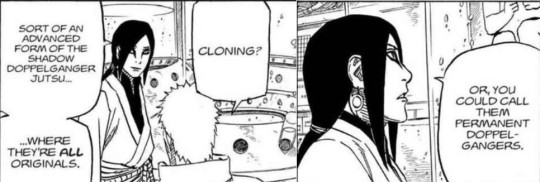


Rather than creating an exact clone that's just a copy of whatever Uchiha whose genes Orochimaru has in his possession, he was able to create more defective Uchihas with their own will and personality. Also the imagery Kishimoto creates by placing Sarada right next to Shin dad and Shin son is so interesting.
However, when Orochimaru is talking about the time lag in their maturation I'm not 100% sure what he means. The ViZ translation and the Mangapanda translation are slightly different. From my interpretation it seems like the maturation refers to their skills, perhaps? and by skills I mean the Uchiha kekkei genkai, the Sharingan. The clones' genes are cultivated so it takes longer to mature/regrow as both translations suggest. Remember that it took Sarada way longer to awaken the Sharingan (12 years) than it would the usual Uchiha.
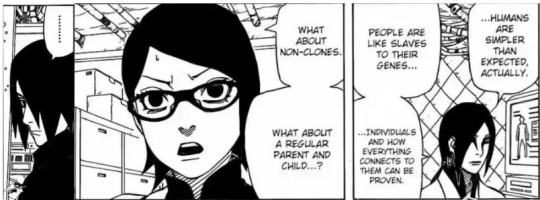
Then, when Sarada asks about non-clones Sasuke remains suspiciously quiet. He could at any moment tell Sarada she's being silly with all these questions and yet he refuses to explain to her what's going on. It's a stark contrast to Choji's reaction. Sasuke could simply go "What are you talking about Sarada? Of course Sakura is your mother".
Orochimaru responds to Sarada they can test her if she wants to but then Sasuke interrupts and says there's no time for that so Sarada asks Suigetsu to test her to see who her real mom is. And once again, Kishimoto usage of visual language and text is very interesting to me
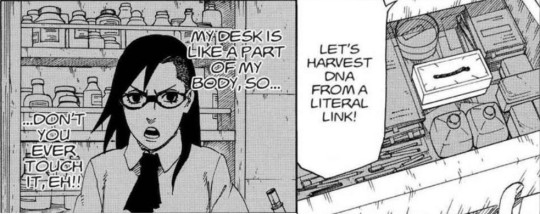
When Suigetsu is looking for something that could hold Karin's DNA we get this flashback of her saying that her desk is a part of her body and then we see the umbilical cord that ended up belonging to Sakura and Sarada. Now, I might be reading to much into it here but I find that choice of words fascinating (I checked three different translations ViZ, Mangapanda & Mangastream and they all translated the same way that panel). The umbilical cord was in Karin's desk, the umbilical cord was in a part of Karin's body. I think Kishimoto is telling us here how involved Karin was in Sarada's conception.

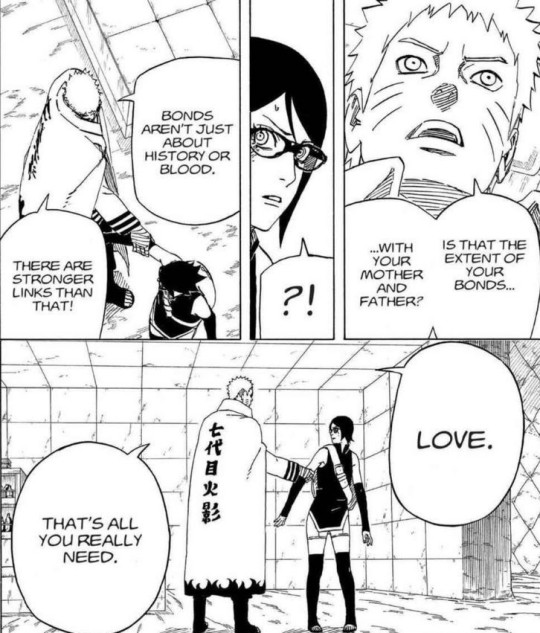
After being told that Karin was her mom and Sarada believes Sakura is just a stranger, Naruto gets upset that she acts like in order to be a family people need to be blood-related and tells her that what actually makes a family is love bonds.

Naruto asks her to see inside her if she feels any love for Sakura and that's when Sarada realizes that she does indeed love Sakura, the woman who has raised her and taken care of her her entire life.
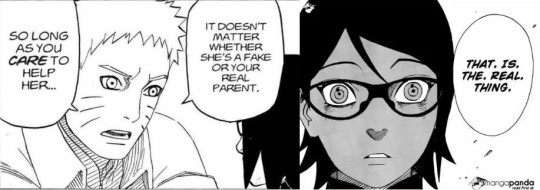
When Sarada cries after remembering her childhood, calls Sakura her mom and tells Naruto that she does care about Sakura and wants to save her, Naruto responds that it doesn't matter whether they're related or not, as long as she cares for her, that's their real bond (Naruto is so lovely in Gaiden)


And it's only after Naruto's TED talk, Sakura's rescue and their final fight against the Shins that Sakura finally tells Sarada that she is indeed her child. Sarada responds that, yes, she is her child because they love each other which is how they are connected, no longer caring if they're biologically related which is interesting to say the least...
Sarada then asks Sasuke if his feelings are connected to Sakura and after hesitating a bit, Sasuke says that he is indeed connected to Sakura simply because they have Sarada. Sarada is touched by this and cries but her parents look miserable. Also, no one seems to ever clarify to Sarada that the umbilical cord was Sakura's, so there's that.
Anyway, when we get to the final chapter of Naruto Gaiden we see Karin clarify that it was Sakura who carried Sarada and then she says something pretty curious.
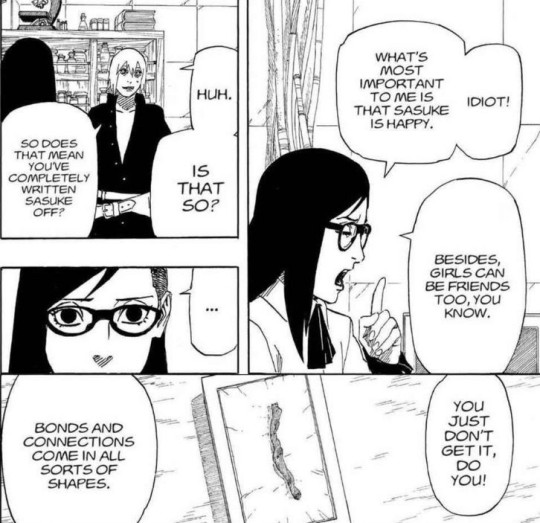
Number one it's very funny how Karin thinks of Sakura as a friend because that feeling is not mutual LMFAO
But moving on, Karin talks about how the most important thing for her is Sasuke's happiness. However, how is Sasuke having a child with someone he dislikes and abandons, helping him with his happiness? It certainly feels like Sakura was desperate to have something from Sasuke considering she chased after him and has the Uchiha crest plastered all over her house and clothes. Maybe both Sakura and Karin remembered Sasuke mentioning he wanted to restore his clan and thought giving Sasuke a child would make him happy, but it backfired on them when Sasuke showed zero interest in that child, probably because Sasuke wouldn't appreciate them using genes from his deceased family members for that shit.
Additionally, Kishimoto continues with the whole bonds-are-formed-through-more-than-just-blood-theme. Karin is also bonded to Sarada hence why we're shown the umbilical cord in her desk. These incessant reminders of the theme of Naruto Gaiden regarding a child that doesn't really know who her bio mom is, feel like Kishimoto is trying to tell the audience Sarada is not the product of a regular pregnancy.
If you've read Naruto Gaiden you know that Sasuke has never kissed Sakura but also that he doesn't allow her to touch him [LINK]. There's basically zero intimacy or romantic moments between the two of them in Gaiden, quite the opposite, Sasuke is either hostile or apathetic towards Sakura [LINK] so I think we can assume Sasuke didn't have sex with Sakura and get her pregnant. Instead, Sarada could very possibly a product of a similar experiment like the Shins hence Karin's odd involvement in Sakura's pregnancy [LINK]. Plus, Sarada not being born in Konoha and there being zero records of her birth, additional to Sasuke not being able to explain to Sarada what's going on, keep in mind he never answers Sarada who her mom is and is always dodging her questions. On top of that, consider Kishimoto spending so much time of Naruto Gaiden writing about clones that aren't traditional clones but new individuals with their own personhood.
Add to that how Naruto had no idea about anything that was going on with Sarada's parentage and it pisses him off but he's not gonna put Sasuke on blast in front of an already dismayed Sarada

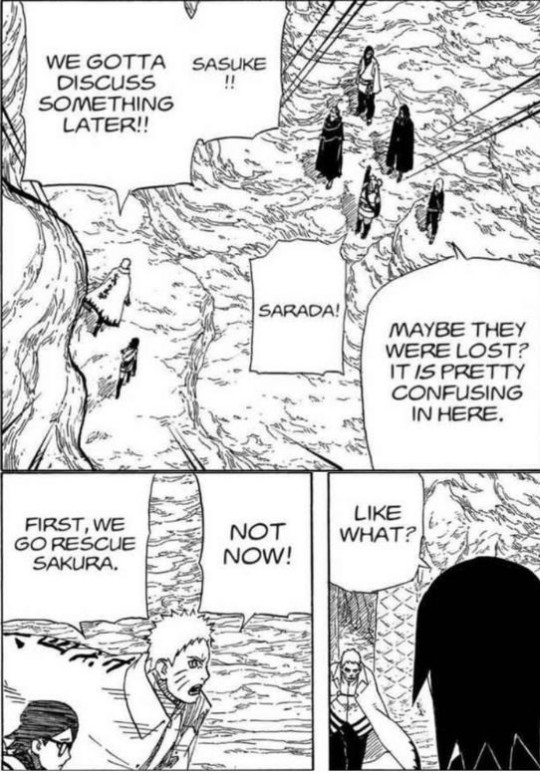
What's up to debate then, is whether Sakura went through gestational surrogacy or traditional surrogacy. If it the pregnancy was a gestational surrogacy, then the egg is not Sakura's and someone else is the biological mother, possibly Karin hence the "my desk is my body" and "bonds come in all sort of shapes" comments and the umbilical cord being in her desk. If the pregnancy was a traditional surrogacy then the egg is Sakura and she is the bio mother.


The placenta and umbilical cord belonging to Sakura, which is confirmed in Gaiden, is not proof that the egg was hers so we really don't know for sure that she is Sarada's bio mom. I find it bizarre that Kishimoto didn't give a contundent confirmation that Sakura was the biological mom and instead kept it open to interpretation.
233 notes
·
View notes
Text
Continuing on the theme of things I've missed while S7 was airing, we have to talk about the (failed) first date. I admit it gave me too much second hand embarrassment that I usually skipped it on a rewatch. Once I managed to brave through that I realized I did miss something important, so here is another scene breakdown. Again, it's just my own interpretation.
The title of 7x05 is You Don't Know Me, that seems to be the theme of the episode: the Wilsons figuring out Mara's trauma, Eddie finding out Marisol's former nun training, Buck trying to navigate the whole dating a man thing, but they all end up making an effort to make the relationship work.

The date scene starts at the end of the actual date. We don't see much of the getting to know each other stuff, but judging by their faces, it's gone pretty well. At this point they don't know about each other's movie preference yet, so Tommy picks a place where they can decide on arrival, with Buck's input. That also signifies the nature of this date, they're literally "keeping their options open" and just seeing where it goes, without any major expectation.

Buck still seems visibly nervous, but Tommy reassures him that they're just two guys having dinner, it's a very ordinary thing that nobody cares.

Buck pretends he's at ease, Tommy points out he seems a little tensed, but he understands Buck's worry. Tommy speaks about the masculine nature of their job and tells Buck that people are more accepting than he thinks, which sounds awfully like it's from experience.
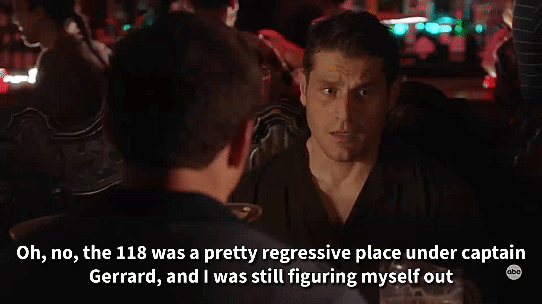
I think Buck sees it too, so he asks Tommy, who seems perfectly confident in his sexuality and masculinity, if he's been always out on a job. Tommy tells Buck about the 118 under G*rrard, this explains to the audience why Tommy seemed to be straight and a part of the boys club back in S2.

So Tommy was at least aware of or questioning his sexuality at the 118. Mr. "my girlfriend is totally coming next week" and "single is much easier than scaring women" was full blown lying about his sexual orientation. Chances are he does understand Buck's nervous fumbling, as he's probably done worse in the past.

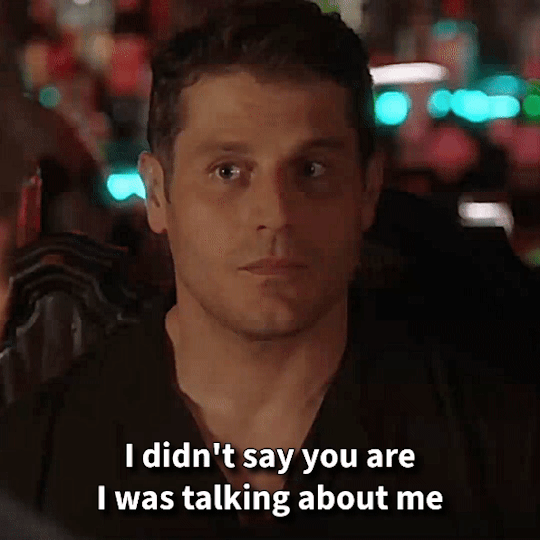
Here comes the seemingly recurring theme of Buck making things all about himself, whether you agree with this or not, he does have a tendency to get stuck in his own head. Tommy assures him yet again that he's not accusing Buck of anything, he's just sharing his own experience to empathize.
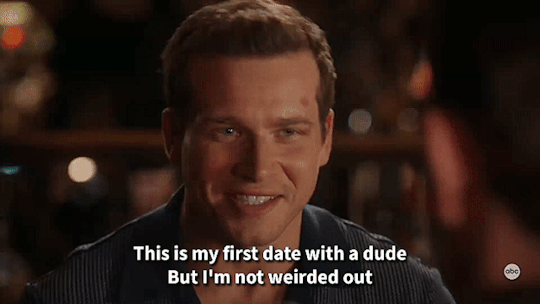
Tommy looks a bit surprise when Buck tells him it's his first date with a dude. It's probably new information to Tommy.

And then Buck tries showing Tommy that he holds no prejudice towards queerness because he's an ally, completely oblivious to the fact that he's also one of them. Tommy tries to follow as much as he can.

Tommy senses that Buck is spiraling, trying to pull out random stuff just to bring the date back on track, so he flirts with him just to lighten up the mood and for the third time of the night, reassure him of his interest in him and the rest of the night.

Then Eddie and Marisol walk in, and Buck panics. I know Buck tells Maddie later that he "makes it seem like they were just hanging out", but if you go back to this scene, Tommy is the one who covers for Buck and takes the initiative to agree with Eddie and tell him they're just doing normal bro hangout stuff.
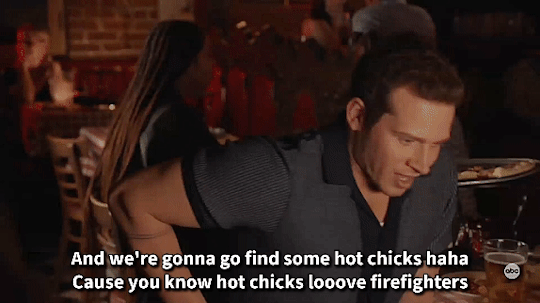
7 seaons in, we all know Buck doesn't have the best luck with first dates. The more he likes someone, the more likely it is for him to mess it up. So of course he has to self-sabotage here and drag Tommy into the closet with him, even though Tommy's already covered for him and Eddie is ready to move on. Tommy doesn't like mad here, he looks disappointed.

For what it's worth, Buck's hot chick comment actually makes things worse. Look at how confused Eddie's reaction is.

This snarky joke from Tommy has caused some controversy among part of the fandom. Some believe that Tommy could've outed Buck with it, but I beg to differ. Eddie knows Buck very well, Buck has always dated women. On the other hand, Eddie has never heard of Tommy dating a woman, he might have attributed it to the recency of their friendship, but that's why he immediately makes the connection in his head that Tommy is gay when Buck comes out to him later in the episode. Even if Eddie had superhuman intuition and understood the double entendre of this closet comment, Tommy would be outing himself, not Buck.
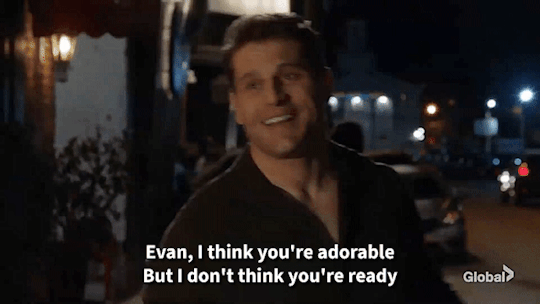
Here is another controversial moment: Tommy doesn't explain anything to Buck until the Uber is here, and he just leaves him there. First, Buck is a grown man, he can get himself home, there is no concern for his safety. Second, Tommy has every right to leave the date if he doesn't vibe with it. When Tommy tells Buck he's adorable, I don't think he's referring to Buck's overall demeanor. I think he means that Buck's nervous fumbling into queerness doesn't scare him, he actually finds it quite endearing. But after reassuring him 3 times, even going as far as telling Eddie, someone they can trust, that they're just hanging out, Buck still feels the need to make the hot chick comment and push them both into the closet, Tommy realizes that things would not go any better if they continue the date. Buck has not fully processed the fact that he's bisexual and he's dating a man. I'm sure Tommy really likes Buck as well, he want to make it work, so to him, the best course of action at the moment is to take a step back and let Buck figure things out himself first.

To Buck this may sound like Tommy is letting him down easy, but I think Tommy is consciously not shutting anything down here. He absolutely will see Buck around, he's still Eddie's friend. Tommy knows they will have to talk about it in the future, but for now, it's best to put a pause on things just to give Buck some space to process. What Tommy doesn't know is that Buck has been dumped so many times that he thinks this is it.
Therefore, not only does Tommy never intend to out Buck during the date, he is willing to keep things ambiguous for Buck's comfort. Ultimately, it isn't enough for Buck, so Tommy takes a step back for Buck to figure things out on his own.
295 notes
·
View notes
Text
Robert Eggers on the ending of his “Nosferatu”
But isn’t it interesting that this female archetype who understands the dark side of humanity and is sexualized keeps being reconstituted as the savior of Victorian culture?” [Interviewer says Ellen dies for our sins] She dies for our sins, in a way, yeah. I think there is a sacrifice. But there is also vengeance, and there is also a weird kind of sacred marriage, in a union sense, and a sort of completion of some kind of destiny, because as much as Orlok is a disgusting abuser, he’s the only person who can understand and fulfill a part of Ellen. Hopefully there’s nuance going on there, and it’s not just this or that. Source
Let’s try to break this down:
Eggers is clearly aware of the audience response to his work, and what the loudest voices are saying, especially in mainstream media, and he’s being very careful with his words in this interview not to “glamorize” his gothic tale, and get misunderstood, hence why he talks about nuance. This is a gothic horror romance tale, after all, it’s supposed to be dark and twisted, based in the OG toxic and dysfunctional love story, Catherine and Heathcliff. This story is pretty much “Wuthering Heights” on steroids.
Eggers talks about his intended “demon lover story” and the “Wuthering Heights” inspiration in this interview, too. Only in “Nosferatu”, the roles are reversed, and it’s Heathcliff/Orlok ghost who’s calling Catherine/Ellen to her grave. And like Catherine’s ghost with Heathcliff, Orlok stalks and torments Ellen to get her to join him in death, until she does.
I’ll start by saying female characters in Robert Eggers’ films are usually sympathetic, but they can also be selfish, cruel and their motivations complex (often not straight-out told to the audience) in reaction to the patriarchal societies they live in. Apparently, many are assuming “Nosferatu” is somehow different from his previous works in this regard… for some reason. This has been his dream project for decades, and he started working on the first script in 2016.
"A Sacrifice"
Robert Eggers doesn’t say (nor confirms) that Ellen sacrifices herself to save everyone, and even calls it “a sacrifice” (not “the” sacrifice like in previous adaptations, which was the sole purpose of Ellen/Lucy’s deaths). To me, the “in a way, yes, she dies for our sins” is also curious, because this implies that’s not the point? This is also my idea of the ending: I think Ellen saving everyone was a “colateral” more than the actual goal.
We know there’s sacrifice involved because that’s what the Solomonari book said:
“And so the maiden fair did offer up her love unto the beast, and with him lay in close embrace until first cockcrow, her willing sacrifice thus broke the curse and freed them from the plague of Nosferatu.”
The selfless sacrifice for the greater good can’t be the only thing going on here (and it isn’t, according to Robert Eggers), because when we look at the three adaptations side by side, there’s a huge difference between them, especially from the heroine side (who doesn’t behave like a “sacrificial lamb” like in the previous adaptations):


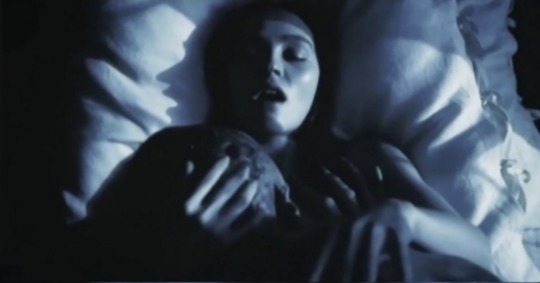
Robert Eggers also gave us a scene to parallel this one with Thomas early in the film, to provide a contrast, and show to the audience how different these scenes are meant to be.
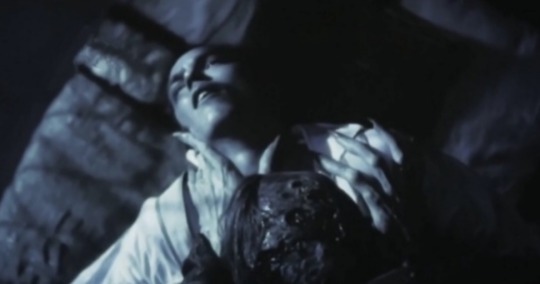
Here the “prey and predator” theme is obvious; poor Thomas is completely at Orlok’s mercy. For the r*pe interpretation “enthusiasts”, here is your scene. This also happened in the OG 1922 “Nosferatu”, as a reference to the “Dracula” novel, where it’s the brides of Dracula who feed off Jonathan Harker (Thomas book counterpart); which is probably why we see a vision of Ellen during this scene.
“Vengeance”
What I find more intriguing here (and even in the 2023 script when it’s said Ellen looks at Orlok with “fiery reckoning” and has “won”, when the sun is rising) it’s how Eggers talks about “vengeance” but then describes Orlok and Ellen union as a “weird kind of sacred marriage”, and fulfillment of fate, because, in spite of all the obsession and raw toxicty, he’s the only one who can understand and fulfill her (Catherine and Heathcliff textbook). This is nothing new, because Eggers has talked about it before:
“Ellen’s husband loves her, but he can’t understand these ‘hysteric’ and ‘melancholic’ feelings she’s experiencing, and he’s dismissive of her. The only person she really finds a connection with is this monster, and that love triangle is so compelling to me, partially because of how tragic it is.”
Who is Ellen? She’s referred as the only heroic character in the film, several times. Like Von Franz says, she’s a woman born out of time, because while in Pagan times she would have been a “great priestess of Isis”, in 19th century Victorian society she’s medicalized because of her supernatural abilities. Which summons up, Robert Eggers explanation:
“She's an outsider. She has this understanding about the shadow side of life that is very deep, but she doesn't have language for that. She's totally misunderstood and no one can see her," he says. "Because of this gift, in her teenage years, she ends up reaching out to this demon lover, this vampire, who is the one being who can connect with that side of her. But then that other, sensual, erotic world is connected to this evil force, which only increases her shame.”
In a interview to “Deadline”, Willem Dafoe, explains his character, Von Franz, an expert on the occult and mysticism, is the only one who truly understands the psychic connection between Orlok and Ellen (which is unique to this particular adaptation of “Nosferatu”): “I’ve heard Robert describe it as a triangle between Ellen’s husband, who’s a loving guy, he loves her dearly, and he’s conscientious. He wants to be a good husband, but he doesn’t quite see her, and he doesn’t understand what she’s going through. And then on the other hand, you have this demon lover that attracts her, and she doesn’t know why, but somewhere there is a deep understanding there and a deep attraction.”
In the same interview, Eggers also says:
“Thomas thinks he's the hero but really his wife, who everyone is calling crazy and telling to shut up and tying to beds, is the only one who can solve the problem," Eggers says. "That's much more interesting.”
We also see this in story itself: in the first and second act, Ellen sees Thomas as her “savior” and often talks about how his love has saved her from her connection to Orlok/Death. And while Thomas tries to embody the “savior” role on the third act, Ellen says to Von Franz: “I need no salvation” because she has never done anything wrong but to be true to her nature. And Von Franz, asks her to act according to it now, too.
This idea of Ellen being the one to “solve the problem” goes back to the first interview I shared: “But isn’t it interesting that this female archetype who understands the dark side of humanity and is sexualized keeps being reconstituted as the savior of Victorian culture?”
Robert Eggers explains that, unlike her friend Anna, Ellen cannot, or will not, conceal her sexual desires. Orlok hears some internal cry in her, and targets her as a result, and in this, Eggers explores themes of punishment and the shaming of female sexuality. In Gothic female novel fashion, Orlok symbolizes Ellen’s sexual awakening, and sexuality, Victorian era sought to contain and repress.
“Particularly in the 1980s, there was a lot of literary criticism talking about all these Victorian male authors who created these female heroines who have sexual desire and sexual energy, and then need to be killed and punished for that,” Eggers says. “It’s this misogynist thing. But I think a lot of female literary critics who I was also reading were saying, ‘But isn’t it also interesting that, from this repressed cultural period, there’s the idea of this dark, chthonic female heroine who would be the person who could understand the depths?’ And in telling that same kind of story in a modern context, even trying to stay through the lens of the 19th century, we could have potentially some more nuance there, potentially, hopefully.”
“Chthonic” is an adjective from the 19th century, and means “inhabitant from the Underworld”
We see this punishment of women who embrace their sexuality in Bram Stoker’s “Dracula” novel, too, with the character of Lucy Westenra (who’s more progressive and liberal) and gets punished (vampirism + death) as a result, while Mina Harker is the embodiment of the modest and virginal Victorian woman and is “saved” by the narrative.
The character of Ellen Hutter in the 1922 “Nosferatu” is based on Stoker’s Mina Harker, and it’s her purity that allows her to sacrifice herself to stop Nosferatu, which Eggers subverts on his adaptation (sex + death). In a way, his Ellen is more Lucy than Mina, and even how Orlok/Dracula lures them is the same (sleepwalking).


On a superficial level, one could interpret this as 2024 Ellen weaponizing her sexuality to destroy Orlok, and getting revenge on him for the torment he put her through, but isn’t this kind of contradictory with the rest? And this is very straightforward, there’s no nuance here, like Robert Eggers says.
I’ve read some weird mental gymnastics to justify Ellen and Orlok’s covenant was broken due to her sacrifice (or whatever), but that doesn’t seem what Eggers is talking about here, nor it fits with the “Wuthering Heights” inspiration on this story. Speaking of which, “revenge” is associated with Heathcliff (Orlok), not Catherine (who’s selfish and indecisive), she’s manipulative but it’s in connection with their desires, not for revenge purposes.
This “reckoning/vengeance” bit wasn’t in the 2016 script, it’s an addition to the 2023 final version, and Eggers has said several times he didn’t changed his story all that much. Ellen planning to die and take Orlok with her, driven by revenge, sounds like a huge change to me, because it’s a whole new motivation. In the 2023 script, we also have a description of how Ellen is ready to marry death, like her dream foretold (the one where she has never been so happy, which seems kind of contradictory if she’s doing it for revenge).
A commentary on the 2023 script, it’s incomplete, has omitted parts and scenes that didn’t play out that way in the final version. One example is in the prologue; in the film, Orlok’s first line is about how Ellen has awaken him, but this line is missing from the script. Ellen embracing Orlok as they die is also not the script the public has access to; instead it’s said he covers his face and falls over her, dead (which doesn’t happen in the actual film, thankfully). So, indeed, there is something dubious about this script. Also there will be a Blu-ray extended version of the film; and this script already has missing dialogue and scenes from the theatrical release, so it can’t possibly be the final version of “Nosferatu” script.

This is the so-called “fiery reckoning” look Ellen gives Orlok as the sun rises. Lily-Rose Depp proved herself as an actress in this role, and I’m not seeing any vengeful expression here. She’s just smiling, which, honestly, can have several possible meanings.
But still, Eggers mentions “vengeance” plays a part in this scene, alongside with the sacrifice, the sacred marriage to Orlok and them being fated. All of these are involved on his ending. Also, we have social commentary on Victorian society throughout the film.
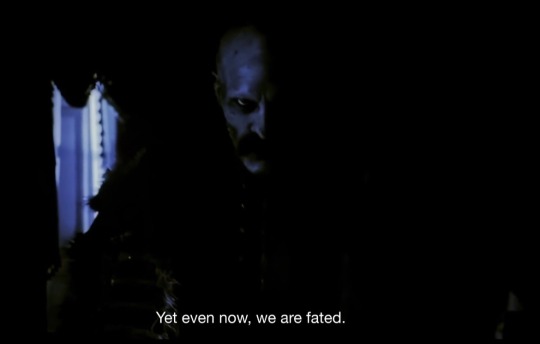
Lily-Rose Depp explains Ellen is trying to come to terms with her own sexuality during the film, and Eggers calls her “heroic” because of her sexuality and her understanding of darkness. We have the cast and crew saying Orlok is sort of an embodiment of Ellen’s dark desires and sexuality (that Victorian era tries to repress and shame).
If she’s getting Orlok killed out of revenge, and herself by extension, doesn’t that, on a symbolic level, signifies that she’s killing her own sexuality and desires? Punishing herself? And doing exactly what Victorian society wants her to do? Which seems to be the opposite of what Robert Eggers intends here? Ellen dying alongside Orlok already symbolizes her sexuality getting punished according to Victorian society (like “Dracula” Lucy) however, she’s the one who’s saving everyone.
“Vengeance” and “reckoning” can also have another meaning: “Vindication”. Which in Christian theology is connected to another word: “Providence”. “She has been vindicated” and “she has won” mean the same thing. “Reckoning” is also connected to Doomsday = Apocalipse = “Book of Revelations”; which can be connected to the occult meaning behind these characters (Babalon and the Beast).
“Vindication” means to prove oneself right after being accused of being wrong by others. To me, this seems to be more aligned with Eggers words:
“But isn’t it interesting that this female archetype who understands the dark side of humanity and is sexualized keeps being reconstituted as the savior of Victorian culture?”
In accepting Orlok, Ellen is accepting herself, symbolically embracing her own sexuality and wearing her shame like a badge of honor. And by extension she breaks the curse of Nosferatu and saves everyone. She’s vindicated because she has been medicalized, drugged and tied-up because of her “hysteric seizures” (which were believed to be caused by a wandering womb, connected to female sexuality) for years, but it’s her empowerment through free sexuality that saves the day, and proves Victorian society wrong.
But this “vindication” can only be possible if all that’s happening here is what Ellen truly wants, because she has fully accepted herself, her nature, because she’s been fighting against her dark desires (Orlok) all movie. Which is exactly what Von Franz advises her to do:
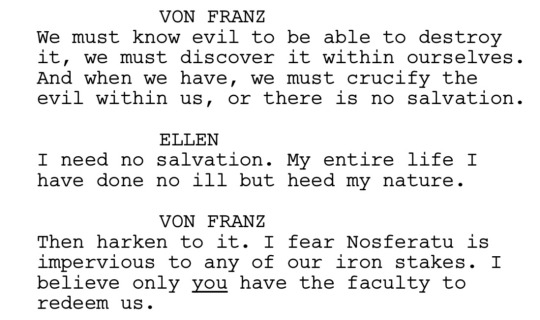
“Harken” means “to listen” or “give respectful attention”.
Then, “succumb to the darkness” isn’t about Ellen passively surrender to Orlok; but about her accepting her true nature and self. She’s the one who says she doesn’t need to crucify the evil within her, after all. Robert Eggers also says he wants to provoke reflection on the audience when Ellen asks “does evil comes from within or beyond?”, but, to him, it’s both.
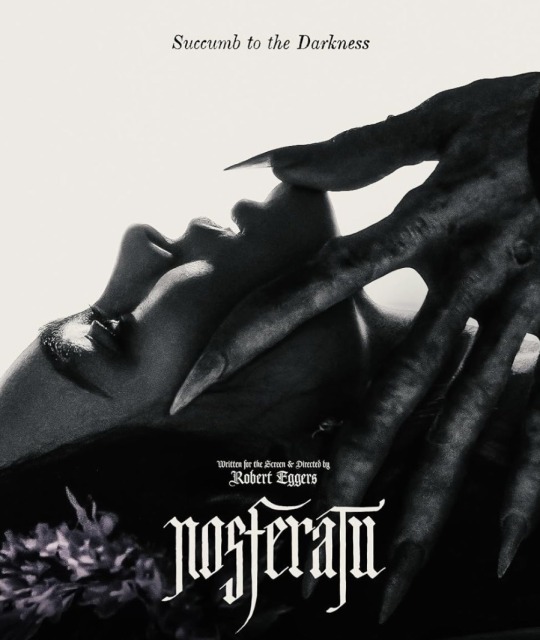
Still, “evil” is nuanced in this film, too. In one interview, when asked if Orlok is the villain of the film, Bill Skarsgård joked he’s the “romantic lead”, but, as Nosferatu/Dracula he’s obviously villainous, but there’s nuance to him in this adaptation. When Ellen accuses him of being a villain, his answer is “I’m an appetite”, after all. He is what he is, he doesn’t hide his nature. The “nuance” to Orlok’s evilness here is most likely rooted in Romanian folklore where the demonic isn’t inherently evil, it’s simply more attuned to Chaos than with Cosmos, where God and the Devil are twin brothers.
Bill Skarsgård says there’s an entire novella on Orlok’s back story that Eggers wrote just for him. Orlok had a family and was once married, but Eggers doesn’t want the world to know his full backstory but it’s detailed.
We are also told Orlok was a sorcerer in life, one of the Solomonari (from Romanian folklore) who studied black magic at the Scholomance, a school in the mountains where the Devil teaches 13 disciples and chooses one of them to be his slave at the end (demonic version of Hogwarts, if you will). He sold his soul to the Devil and became a vampire as a consequence.
Wicked Sacred Marriage
“Bride of Dracula” theme. It’s pretty obvious. Count Orlok and Count Dracula are the same thing, and Robert Eggers’ “Nosferatu” is also based on the Bram Stoker novel.
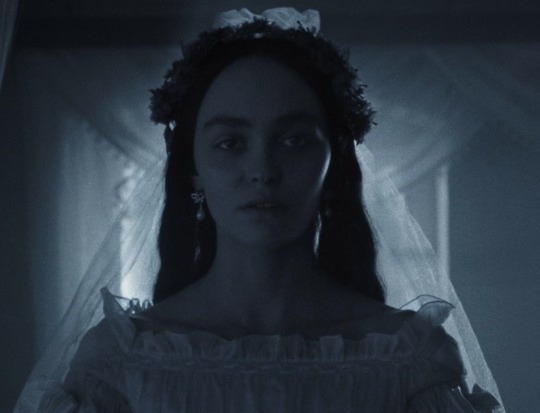
Not only Herr Knock bitterly says Orlok only cares about “his pretty bride”, but his covenant with Ellen is literally “And shall you be one with me ever-eternally.” And then even consummate it: “As our spirits are one, so too shall be our flesh. You are mine.”
Ellen saying to Orlok “You cannot love” is a reference to Bram Stoker’s novel, “Dracula”, when one of Dracula’s brides accuses him of the same: “You yourself never loved! You never love.” And his answer is: "Yes, I too can love. You yourselves can tell it from the past. Is it not so?”
In “Nosferatu” (2024), Orlok takes the “Heathcliff route”, but his hesitation after the “I… cannot” and the context of their conversation (“remember how once we were?”) is a direct parallel with Dracula’s exchange with his bride, in the novel.
The “I’m unclean” is also a reference to Bram Stoker novel, by the way.
But in this story, vampires aren’t made the “traditional way”; Orlok’s victims don’t turn into vampires, they just die. Orlok himself is dead, and his spirit appears to be trapped in that rotten corpse. Him physically dying is the only way to set his spirit free.
Fated
Why are Ellen and Orlok fated?
I think this is what Ellen was asking Von Franz at the beginning of their last conversation: “I must know… why me, professor?” Von Franz replies she was born to the occult. So, indeed, it has occult meaning. Which is also connected to the “sacred” part of her marriage to Orlok.
I already talked about this in another post, but I don’t buy that Orlok was deceived by Ellen: they were both meant to die, and knew what they were both signing for. Because this was the only way to complete their covenant, and the book with the knowledge of how to defeat Nosferatu belonged to Orlok and was in his fanatical servant office (so he obviously knew about this, and was a part of his plan). Eggers isn’t a director that leaves things to chance.
And in true “Wuthering Heights” fashion, Ellen and Orlok, like Catherine and Heathcliff, couldn’t be together in the living world, only in the spiritual world, united by death. And Ellen, like Catherine, dies and leaves behind a grieving husband, Edgar/Thomas, while being reunited with Heathcliff/Orlok in spirit.
Ellen was “fated” to break the curse, which involved “offer[ing] up her love unto the beast, and with him lay in close embrace”. She has a connection to the Underworld, and she fulfills her role as “priestess of Isis” in the end. She’s also the one who awoke Orlok, and she’s the only one who can tame him, and destroy/free him from Nosferatu curse.
#nosferatu 2024#robert eggers#Count Orlok 2024#Ellen Hutter 2024#Bill Skarsgård#bill skargard#wuthering heights#lily-rose Depp#Lily rose Depp#ellen x orlok#orlok x ellen
113 notes
·
View notes
Text
The Wigmaker Job
Notes and Thoughts - Part 3
pt1 | pt2 | pt3 | pt4 | pt5 | pt6 | pt7 (FINAL)
DISCLAIMER: These posts I'm doing are my own analyses and are done with the intentional eye to examine the relationship between Lucanis and Illario. I try to source all my assertions from what the text is giving me. This is not Lucanis critical nor should it be taken as such.
Going to be a shorter post today because I have things to do this morning!
Starting off strong in the next scene with me… loving on the fashion notes <3 So glad to know that we get stiletto heels clicking against cobblestone. Surely hoping that no magister twists their ankle and falls and breaks their fucking neck because their shoe got caught in a gap!
Also, velveteen is in? Someone who knows fabrics weigh in and tell me if that would be an appropriate material for the climate.
"So the Wigmaker. Tell me about him." / "He's weird." ← Lucanis goes on to say that he 'finds the moment before a job crucial for focus, but Illario was never one for comfortable silence'. To me, that beggars the explanation that the following passage is Illario goading him a bit.
I: "Specifics, cousin. No one hires us to kill normal people." L: "I gave you a dossier." I: "Yes, but I want your assessment." L: "I wrote it. It is my assessment." I: "Humor me." L: "You'll see soon enough."
There was a little bit of debate in my previous post about whether or not Illario actually read Lucanis's dossier. I don't think that the text supports that interpretation, but everyone is allowed to interpret what they want.
I'll argue that Illario has read the dossier: throughout the story up until this point, Illario has made comments about the job that implies he has SOME understanding of what they are doing—even going out of his way to make arrangements with a tailor so that he can be prepared for the part of the contract that Lucanis asked him to help with.
He knows that they need to be in Minrathous, at a party, facing a 'premiere wigmaker', and aware of the fact that they're up against Venatori. He knew they needed to be at a mansion and all of this comes up previous to this point when asking about Lucanis's assessment.
Additionally, asking for more clarification on something that someone else wrote is actually normal when the plan has clearly changed several times. Illario has increasingly expressed confusion on how the navigation is being handled, and, when asking for more information, is specifically asking after the Wigmaker himself, not the entire plan.
Also, the narrator is telling us that Lucanis prefers to be quiet while Illario likes to talk. It was pointed out to the me that this is close third POV, so why would the narrator bring that difference up, and not reference the idea that Illario has a tendency to not read documents?
(A few paragraphs later, while balancing on the rooftops, it's stated that 'At least Illario was too busy concentrating to ask questions'.) ← I wonder why he'd need to ask so many… I'm not trying to be snarky, but I am trying to make a point and using the text to support it. This also is NOT Lucanis crit and I'm worried some people are interpreting it as such.
The commentary from Lucanis about the previous Minrathous parties is insane btw. Retching vases? Acrobats? An orgy? No wonder they kept us in Dock Town in VG… (shakes fist)
First mention of Lucanis's sensitivity toward the Veil. "The backs of his eyeballs itched like he hadn't blinked in days". I think he says this primarily about blood magic at some point in VG? Which tracks and keeps up with WMJ.
"Something's wrong." / "Yeah. We're up here, away from the fun." ← insane of illario to say this i'm sorry. bro there are blood mages down there.
L: "Focus." I: "I am." L: "On the job." I: "To be fair, you never told me the plan."
You guys get it at this point. (That last sentence loops back up to my previous point… Illario has read the dossier. He knows the contract. He does NOT know how Lucanis is going to HANDLE it beyond what he's been asked to do re: getting Lucanis inside).
Lucanis shrugged. "Find Ambrose. Slit his throat." "Sounds complicated." "It will be. The Veil's thin here. Thinner than I expected."
Illario seems pretty fine with this explanation so I am not going to keep dragging it out. I do like how in-tune Lucanis seems to be with his abilities! I wish we could've seen more of that in VG; iirc he doesn't comment on the state of the Veil or magic very often?
This is the part of the story where we get to see their back-and-forth and how Illario is a bit of a rake! Which I personally enjoy. I love a manwhore (*said affectionately). Sorry.
"Plenty of time for some good, old-fashioned debauch—" I think he's funny. And maybe a bit distracted.
The narrator describes Ambrose as 'of average height and build' which is a description that pisses me off when fanfic does it and published works are not immune to my ire. What the hell is 'average'. That's so subjective.
The rest of the description is nice, though: hawkish gold eyes and a jaw that could break teeth. ← I know I said this was a breakdown of the brothercousin dynamic but I need to weigh in on other things sometimes. <3 Heart.
"They're never what you envision, are they?" Illario noted. "What did you expect?" "Hair, for one. Maybe a funny little dog." That got a chuckle out of Lucanis, if only briefly.
Stop being funny!!! I do like this banter back and forth because this feels like it's the least… leaden with underlying, complicated dynamics? I like it a lot and it feels natural for them.
Making notes on the fashion of the guard-captain. 'She wore an emerald gown with a high-waisted, low-tiered skirt and a fitted tulle bodice studded with champagne-colored crystals. Metallic body paint shimmered on her exposed arms and legs'. ← Fascinating.
It sounds like it might be a reference to the women's fashion from the Tevinter concept art. Bit gaudy.
Also it's described as silk-brocade. AGAIN PEOPLE WHO KNOW FABRICS WEIGH IN.
[shrek meme] she's not even wearing velveteen.
Lucanis "I need those keys" Dellamorte and Illario "your wish is my command, cousin" Dellamorte you will always be famous to me. Also it says that Illario 'flipped forward' which . why are we doing all that
Quotes are either paraphrased or taken directly from The Wigmaker Job, written by Courtney Woods.
#dragon age#dragon age analysis#dragon age meta#tevinter nights#the wigmaker job#my analysis#long post#illario dellamorte#lucanis dellamorte#house dellamorte (meta)
95 notes
·
View notes
Note
Do you think Spite cares about Rook and the others?
This is an interesting question. Canonically, spirits in general don't feel things the same way mortals do. They certainly have emotions, but they're less complex than ours, often aligning with what type of spirit they are. Spite is a malevolent spirit, therefore his emotions are mainly negative.
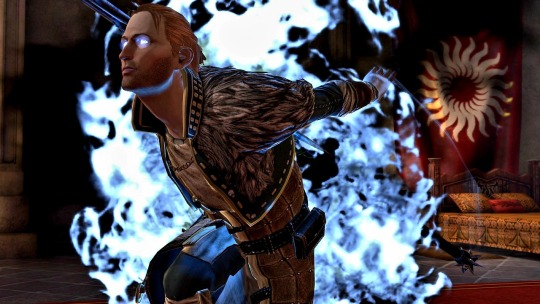
That said, since he's linked to a human, it is possible Spite's feelings are influenced by Lucanis, and vice versa. Unfortunately, the game doesn't go into a whole lot of detail on this, which is one of the many complaints I have with the writing. As we've seen from Dragon Age II, Anders was severely influenced by his spirit, to the point that it became lethal to the team, depending on your choices. Moreover, when you try to twist a spirit from its original purpose, it becomes a demon, and I'm forced to wonder if that includes making them feel more complex emotions.
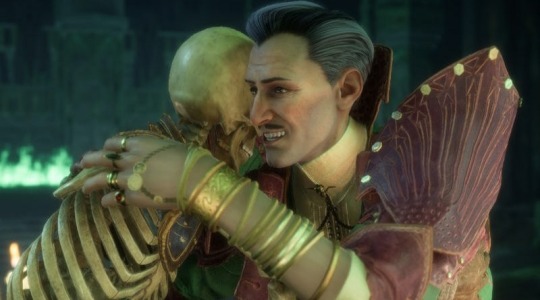
Emmrich believes spirits are capable of expanding beyond their naturally simplistic state, which could very well be true if we consider the Evanuris—but Spite's case is fundamentally different. He doesn't take on a physical form and he didn't leave the Fade of his own accord. Manfred is a spirit of curiosity, making him a benevolent type, and he has no trouble distinguishing right from wrong (even pointing at Hezenkoss and yelling "bad"), but his emotions align with his nature and Emmrich is the perfect mentor, allowing him to fulfill his purpose.
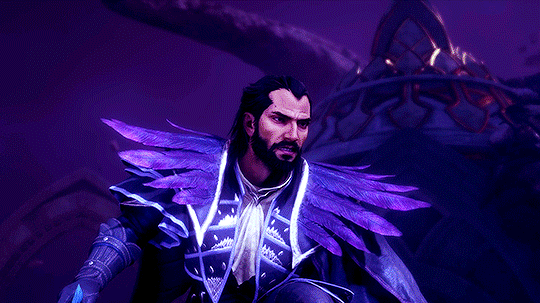
Spite doesn't have the same luxury. Lucanis is an assassin, but he has no interest in harming innocents, he doesn't care about revenge, he isn't sadistic, and he even stops Spite from killing his cousin in a rage. So the questions we should really be asking are: can malevolent spirits feel positive emotions without being corrupted? Would Spite change at all? And was he already twisted from something else when Zara pulled him from the Fade? Solas implies he is or was actually a spirit of determination, but his agreement with Lucanis may have altered his purpose. This was such a missed opportunity that I wish the devs expanded on.
Now, whether or not he cares about Rook and the team, there is a factual answer. I don't even think it's open to interpretation at this point. Years ago, following the lore, I would've said "probably not", but he definitely shows some form of affinity for them, even "missing" Manfred if he dies. Yet the moment that gave me pause when it comes to Spite was in the Heights of Athim, when I neared the giant well. I managed to find a clip and I'd like to explain it.
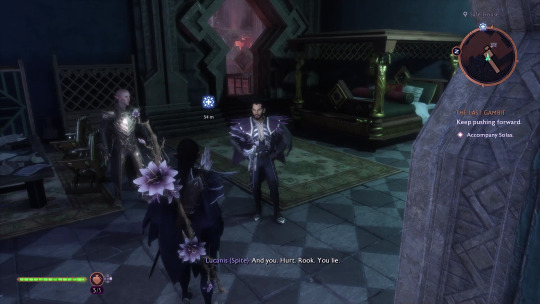
The spirit in the well is a spirit of despair. These spirits lure people in with promises of something that brings them comfort, like it did to the farmers in the Hossberg Wetlands. In that scene, it's trying to lure Spite in using Rook's scent—meaning Rook is a comfort to Spite. He also gets irrefutably angry at Solas for hurting them. So whether or not this muddles the lore a little, I think it's safe to say Spite absolutely adores Rook.
#lucanis dellamorte#lucanis#spite#spite dragon age#emmrich#emmrich volkarin#dragon age#veilguard#da: the veilguard#dragon age the veilguard#dragon age lore#rook#manfred#lucanis x rook
92 notes
·
View notes
Note
You know what I really want to see from Elbaf? Usopp's initial view of Yasopp being slowly whittled away by what he witnesses from the giants.
Imagine him seeing giant warriors stampeding through the village because they're so happy to go home and see their families. Sweeping their spouses up to twirl them around and lifting the little ones on their shoulders. Some of them haven't even been gone that long but each second apart was too long.
Giant fathers weeping loudly over their new babies because they're so cute it's too much to bear. Teaching their sons and daughters how to walk or chop wood or hunt or hold a sword or helping prepare them for their first adventure.
Sitting around the hearth, telling stories and sharing meals.
These aren't just brave warriors of the sea.
They're protectors. Playmates. Teachers. Healers. Carpenters. Providers. Motivators. Friends.
Not even the fiercest battles or the most treacherous of storms could keep them from coming home to their families. Some of them have even hung up their axes and swords for now because giants live very long lives, there will always be time for adventure. What's a decade or so to spend at home where you're needed?
A decade where you're needed. Who could imagine?
On my knees begging and screaming for Oda to give Usopp that good angsty family screen time he gave Sanji in WCI!
This is something I’ve thought about a lot before Elbaf even began, based mostly on the Big Mom Elbaf flashbacks. The society and culture of the giants seem to heavily depend on loyalty and a sense of togetherness, a real “it takes a village” kind of place. It’s definitely a place where a doting sweetheart like Usopp would thrive and a place where a sniveling bastard like Yassop would feel like an imposter in.
I can easily see a scene where some of the warriors of Elbaf find out about Usopp heritage and immediately began asking him about all the shooting techniques his father taught him or the no doubt lavish gifts and spoils from travels he was given only for Usopp to very nonchalantly say that he hasn’t seen his father in over ten years at this point. The giants almost immediately are sent into an uproar, disgust and anger and disbelief at the thought. Usopp would try to joke and backtrack because despite everything he thinks so highly of his father and is so impassioned by his dream it made Usopp want to head out to sea as well!
The giants aren’t having it though, they can’t believe they broke bread with a man like that! All of Usopp’s arguments fall on deaf ears, the warriors of Elbaf are this close to calling Shanks and demanding his sniper's head for a pyre. In fact, all of Usopp's claims make them even madder! How could such a sweet, brave and enduring young man be left to his own devices by that! That!
Coward.
(Side note I’ve heard and seen a lot of different interpretations of how Usopp and Yassop meeting again could look like but there’s a sick and evil part of me that wants Yassop to find the courage to actually greet his son and..Usopp just doesn’t recognize him. It would heal me I think.)
#the giants are just that one meme ‘Usopp we gotta kill that guy’#Dorry and Broggy are already on the phone with Shanks..Yassop if you’re reading this it’s too late#one piece#usopp one piece#sniper king usopp#god usopp#one piece yasopp#Yassop slander#Elbaf#elbaf arc
80 notes
·
View notes
Text
I didn’t know how much I needed Jonathan Sims to ridicule my decision making skill.
This game felt like a dream come true and was so my vibe, I can’t wait to find all the branching paths but man those endings…
Spoilers from my playthrough and the game’s ending below
TW: Some Gore talk
So my goal was to be as non-violent as possible (almost always choosing to leave the dagger), and while it’s likely you can get this dialogue anyway, it made me weak.
To have a divine entity tell me “you have a gentle heart” when I told it I didn’t want to hurt it anymore. Floored me.
The game also captivated me in the way the voices worked. Because it’s the same way I hear voices in my head. They don’t have control over me, (unlike the game) I know they are fictional and they are more of a nuisance then anything. They just pop in and out to say their piece, even if I don’t want to hear it. I prefer to think of it as my conscience trying to get through to me in a different way.
Any way back to the game, I made a save right before confronting the narrator and got to see most of the endings (I think).
My first was getting back to the cabin with the Voice of the Hero. I left the dagger upstairs to go to the Princess and figure out what happens next. I always asked for her name, and never got one other than then what the entity called itself, The Shifting Mound.
But the Princess gave me a name, she called me Quiet (due to you actually being a god called the Long Quiet, which was a really cool twist). I found the nickname adorable, so in my head I started calling her Shift. My choice, as always was ever the peaceful option.
I told her we could just leave, and she trusted me. I thanked the Voice of the Hero, who stayed behind to look for the others when we decided to leave. Then together, the Princess and I opened the door, and we’re left to interpret what happens next. I think this is the “good” ending or at least mine.
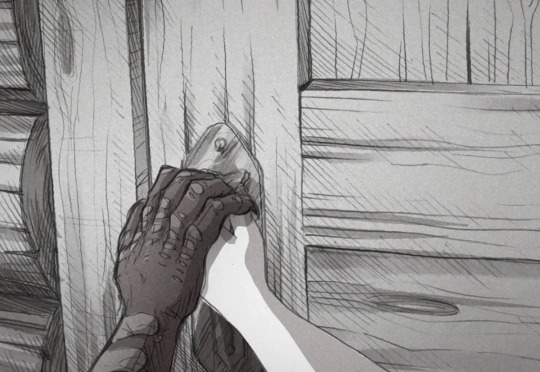
I also love any ending in which the Princess is given agency. If you bring the dagger downstairs to her at the last scene, she offers to stab you with it. Doing so will reset everything back to the beginning of the game, in the hope that things will be different the next go around and the world won’t end. And even if it isn’t, at least they will find each other here at this moment again and again, and both make the same decision.
I love this ending, especially due to the explore options before taking it. I remember saying something along the lines of “I’ll miss you.” And she says I won’t have to, because when I come back, she’ll be right there waiting for me, even if she doesn’t remember.
I also quite enjoyed the endings of becoming gods together. While it’s still good, I think arguably the ending I personally don’t like is the Narrator’s want which is slaying the princess at the end.
In terms of individual branching paths, I love the spectre ending where you let the princess possess you as a ghost, the “hey killer” really got to me. The one where she becomes like a demon girl and just wants to fight is really funny until it gets really sad.
I was also cooked from the beginning because my first path when she started to gnaw her arm off, it unnerved me for a few seconds before I was like “well if I was trapped with no way out I’d probably end like this too.” Then the huge puppy dog eyes she has whenever you’re helping her remove her arm.
Overall 10/10 I love this game so much, and having Jonathan sims as all the voices in my head was a real treat. Will get all the achievements eventually!
And the first romance ending was so funny because I hear Archivist Jonathan Sims narrating with a bunch “ews” the whole time. IM SORRY JON IF I MEET AN ENTITY I WILL GREET IT WITH LOVE AND UNDERSTANDING. I know she started to gnaw off her own arm but I get it!!!
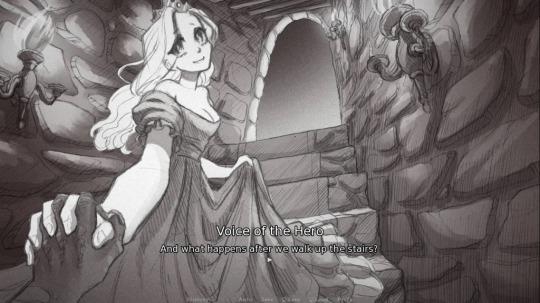
23 notes
·
View notes
Text
TDP Rewatch S2 E4: Voyage of the Ruthless
I wanna write in the Different Path Taken AU but I'm havin a Real Bad Day physically and cannot currently summon the brain cells to be coherent on a page, so we're gonna go back to the rewatch this morning.
Viren has the intro voice again.
I like that Lujanne specifies that the arcanum isn't some instinctual "knowing" of their primal source, it's literally a Bit Of Magic that they're born with.
Rayla, it's real rich of you to be rolling your eyes at Callum talking about primal magic and the arcanum when the SECOND he gave you a chance the day after you met you were info dumping on him about primal magic. But then I suppose that's like asking an ecologist biology questions - there's overlap in the fields but they're not the same. Rayla's interest lies in the magical ecology of Xadia and draconic linguistics because her parents were dragonguard. Callum's is in the usage of a specific natural resource. It's also neat because this is one of the ways they kept Rayla from being a mary sue character. She's special, because she has a very strong connection to her arcanum and mastered parts of it way faster than many other elves, she could be a very powerful moon mage - but that's not where her interest or her training lies. Her actual talents are separate from her inherent specialness.
Rayla grinning after rescuing both Ezran and Zym because they're safe, but also "it's nice havin' both hands again." is great, I love the lightheartedness of the early seasons.
Oh we're back to Amaya at the breach! I thought this was a really neat section for her here, but I also Disliked Fen personally for how he treats her. She signs to this man who's supposed to be her interpreter, and not only does he not relay her words to the soldiers who aren't looking at her, he keeps his own hands folded behind his back and just talks back. Which, behind a thick beard and moustache, in low light, makes her have to work much harder to understand him. Why isn't he signing back to her at the very least? Is this not his fucking job?
Especially since when she expresses concerns, he initially just argues with her. She has to double down before he listens to her.
Callum says "Wow, Ez! I didn't know you could understand all that!" about Ezran finding out Phoe-Phoe is just tired, but like uh. Lujanne did already tell y'all that she's a Moon Phoenix who can't get too far from the Nexus or she gets weak. There was background information already given to you to fill out why she's so tired lol.
god, Rayla even looks so baby compared to later.
She's so fucking cute entertaining Ezran with her Human Impression. I love her, it's so wholesome. Also, "I'm excited to eat a whole plate of unwholesome food in an excessive portion size!" called me out while I'm eating, miss please. AND THE ROADS AND PATHWAYS JOKE IS SO FUCKING ACCURATE. Discussing which roads and pathways take us places slightly faster than other roads and pathways is like 50% of conversation with my father as an adult, my god. I also love her and Callum just switching off being The Grown-Up throughout this journey.
XadiaTube channel FallenStar Unboxing Video entrances local man
I love Villads so much. I need to make a WoW character based on him. The phrasing "mutinous seagulls" implies that the seagulls were originally part of his crew, which is absolutely hilarious with his first mate being a parrot.
Bless TDP for giving us such golden lines as "Last thing I remember I was talkin' about narcolepsy and fallin' asleep!"
There was some post back when this season first came out about how this whole scene with Aaravos and Viren was a euphemism for sex and having a baby together, and I really hope the originator of that theory feels so fucking vindicated since that became Official Fucking Canon, that they are having A Child here. Aaravos is baby trapping him. That is this plot line. I cannot breathe
I do think, in more serious news, that Viren saying he needed time to think and leaving is the moment Aaravos decided he needed to be on the lookout for a stronger dark mage once he got free. Viren was the one who contacted him and Viren was taken in enough that he could work with this, but he had his eye out for a replacement the moment he realized he was dealing with a coward. He needed someone who wouldn't hesitate.
Rayla and Callum are both so good with kids. "It's my rare glow toad impression!" She says to make Ezran laugh instead of complaining of how sick she feels.
Villads and Berto are such an excellent pair of characters. I love them. and yes, Ezran, the bird just said the word "squawk". A lot of parrots end up doing that because people say it around them so often but it makes me laugh every time.
Though I do hope a human goes and reties that knot holding the boat by the dock, because Berto definitely didn't get it secure.
I do wonder why Amaya's the only one mounted when she takes the scouting party to investigate the Breach.
Oh also something I didn't notice the first time round: Fen did mention earlier that this is the hidden outpost on the Xadian side of the Breach. While Viren's spinning lies about a massing of elves at the border, Amaya's actually establishing an outpost in their territory, not the other way around. She's the aggressor here, not the defender.
This was a very well-planned trap on Janai's part, and I love watching her and Amaya clash early on because it really displays both of their strategic skill. I also love that the soldier warns Amaya with sign language, that it's such an integral part of how she's portrayed and it actually helps her out here.
"I know that face. That's the 'dumb idea' face." Rayla says it so fondly and then goes to perch next to Callum to talk to him, and I just. I love how their relationship develops over time. There's already this connection between them at this point, an understanding, and it really helps drive in and support her being his deepest truth in Arc 2.
"If you die out there, I swear I'll kill ye!" I love her so much. I also love the contrast between Rayllum and Ruthari on this concept, because like. Ethari is fully like "Do what you must and if you die I will live with it because I believe in you and your cause" when Runaan goes into life-threatening danger. Rayla threatens to kill him if he risks himself too much. It's just sort of a neat contrast from the parents' generation to the next, the resignation to death in one and the determination against it in the other.
I'm wheezing, Viren like "WHY DIDN'T ANYONE INFORM ME", apparently forgetting that he's been in his super secret evil dungeon for like three days straight, and the Crow Master jokes about a secret chamber, and see this, this is why I love Viren as a villain because he's so hilariously bad at it. His excuse is that he's been in the bathroom. For THREE DAYS. He really just word vomits and depends on his charisma stat to be high enough to validate whatever random bullshit he says.
Poor Crow Master embodies the customer service mood. Hear about a customer's bowel problems that have kept them in the bathroom for three days? Shove their stuff at them and attempt to politely shuffle them out the door because you Do Not Need Details.
Also Viren being in full villain mode and the Crow Master not doing anything about it is also delightful because like. Yeah. Yeah customers say stupid and downright villainous shit all the time. He's not getting paid enough to deal with this nonsense. This dude threatened his life last time he tried to refuse service so now he's just keeping his head down because fuck that. Whoever wrote this character has worked retail.
I love how physically imposing Janai is. When we get to know her better, we see her softer side a lot more, but she's designed so Powerfully here in the early seasons and I love that for her. I also love the "come at me bro" gestures she and Amaya exchange and lowkey headcanon that's the moment that both of them were like ah fuck she's hot. Like the animosity was very much still there, they didn't hate each other any less, but the grudging "goddammit yeah actually she's hot she's just also my mortal enemy".
I love how fucking feral Janai gets in her heatbeing form. Like she's roaring and running on all fours at different points.
"I thought I wanted this badly enough, but in the end, I didn't have the guts." Callum angsts, and Rayla just says "Good" and gives him a hug, and I just. I love that moment for them. Because she also didn't have the guts to do what she was supposed to do, and now Ezran is still alive and they're on this quest but she still feels the guilt of the ones who died because of it. And now Callum has also hesitated and is upset and she tells him it's good. Because she likes him alive. Because it's worth it.
It's also a fascinating mirror to Viren chickening out on Aaravos, also not having the guts to go through with the magic at the last minute. If Aaravos hadn't decided to seek out a backup mage before now, he does it when Viren covers up the mirror and we see that look of surprise on his face.
I do love the credits sketch of Corvus just sitting on the ground pouting with Claudia and Soren high fiving above his head. That poor man. What has his day been like, traveling with Those Two idiots?
#the dragon prince#tdp rewatch#tdp rayla#tdp callum#tdp ezran#tdp viren#tdp aaravos#tdp amaya#tdp janai#tdp fen#tdp s7 spoilers
15 notes
·
View notes
Text
Haunting Adeline is bad.
It only gained hype because of the controversial themes because the construction is crap. A poorly written book with shameful dialog and characters shallower than the drain in my sink. The book makes an effort to be profound, showing how cruel and dark the world is, but in the end it tries so hard that it's more like those One Direction fics kidnapping Y/N. Adeline herself as the protagonist seems to have come straight out of a Wattpad self insert. It's also unnecessarily long. There's no justification for this story being 600 pages long, let alone a sequel. If you take away all the unnacessary bullshit, the whole duology could fit into a single book.
Such a long book, but it still fails to introduce us to the basic concepts of the characters. So many things are poorly explained that they basically expect readers to accept just “because...”? For example, Zade's motivation? I finished the book without understanding his backstory and why he would go so far to do what he does. “That's because he's angry about the existence of child trafficking”, congratulations Zade, you're a normal person who is outraged by child violence, so what? One person finding abuse wrong (which in itself is ironic when it comes to Zade, given what he does to Adeline) isn't enough to justify everything he does. He ends up being the author's puppet for action and smuty kinky scenes, rather than a complex character.
Speaking of kinky, I see a lot of people (including the author apparently) who don't know the basic difference between fetish and abuse. All fetish and kinks, including cnc, needs to be done in a healthy, safe and consensual way. These are the basics of the practice and are non-negotiable. Practically all the sex scenes in this book that take place between Adeline and Zade fall into the dub-con (dubious consent) spectrum. Whether it's because he's forced himself on her, coerced her, manipulated her, etc., from the lightest to the heaviest, all the sex between them has a non-consensual aspect in addition to the disparity of power in the relationship that was not negotiated between them. So you can't use the excuse that it's a fetish so anything goes, because that's simply not the reality. If you let go of the dark romance for a second and actually research how this works, you'll quickly realize that the way this book deals with fetish is extremely off the mark.
Lastly, there's the issue of human/child trafficking. I see a lot of people criticize how graphic the scenes are, which for me wasn't a problem, but very few people talk about how the vision portrayed in the book refers to a line of thought that connect whit the crazy right-wing american conspiracy theorist mentality . Whenever there was a scene involving violence against children, I had the impression that H.D Carlton had studied the subject on the QAnom forum. Anyone who does the slightest bit of research on the subject knows that the main victims of this kind of violence are not the white suburban American children of the traditional family, as we see repeatedly portrayed through Zade's missions. It's not a black van that springs up in an upper-middle-class neighborhood and steals away a beloved child while their parents cry copiously over the loss. Those who are targeted are usually non-white, disabled children from very poor areas who are generally forgotten by the system. Not to mention that the book kind of implies that most of the guys involved in the dirty work of kidnapping the children are Mexicans and mestizos. These are the people we see Zade, the white guy, fighting against to save the day. Also I'm not Jewish so I can't say 100%, but the way the author constructed the secret society plus all the strange and conspiracy-oriented things in the book gave me an anti-Semitic vibe. The secret society in this book is literally a ctrl+c ctrl+v of Blood Libel. Maybe I'm going too far with my interpretation, but considering that the author literally had to put a disclaimer at the beginning that she has no connection with conspiracy theory groups, I don't think I'm so wrong to notice parallels.
43 notes
·
View notes
Note
the 2004 movie doesn't change much from the musical but it still feels so much worse
That is the power of directing. There are small differences between some of the stage productions and choices like actor interpretation and directing can make a huge difference as to how we experience the show. I have seen productions that made me totally get why some people ship Erik x Christine and some where the actors play Erik so aggressive and Christine so meek that I can't fathom it. In the 25th anniversary recording idk what they did with Raoul but there's such a distinct lack of warmth or tenderness for Christine that I find myself not wanting them to end up together vs the original recording where Steve Barton is affectionate and kind in his gestures and tone of voice when he speaks to Sarah Brightman. Direction and casting can make a world of difference and nearly every choice made for the 2004 film was completely wrong and even seemingly small changes have a massive impact. I'm not going to talk about Gerard Butler's singing or the lack of significant deformity, there's nothing I can add to that conversation. Casting an actress as young as Emmy Rossum to play in a love triangle between two men in their 30's was a bad decision because there are shots where she seems especially childish and I can't get past the notion that I'm looking at someone who should be in high school. Then there's the decision to show a scene of Erik approaching Christine while she's still a child when it's implied he's only a few years younger than Madam Giry. The dates on the gave stone that imply she's only 16 and....I really want to give the benefit of the doubt and say it's an oversight but the age of the actress and the scene of her as a literal child when she first hears Erik are just too much for me to handwave as "someone made a typo somewhere" the scene where we see some of Erik's backstory where they put him in a sideshow as a small child and he goes directly from childhood to living in the paris opera (How then, did he help BUILD the opera house? Why does he still have the punjab lasso if he's never been outside of Paris? This creates so many plot holes it's ridiculous) and there is some really really uncomfortable, even offensive depictions of Romani people. Carlotta is always meant to sound overblown and unpleasant and sometimes even shrill to the audience but they go the route of emphasizing her as an in-universe bad singer whom no one likes. Minnie Driver does her best to make the role entertaining and she's easily the best thing in the movie but she could not salvage it. The managers also with their stupid "Scrap Metal" running gag, Joel Schuemacher and ALW are determined to make everyone look as stupid and incompetent as possible. Piangi has a little person who mimes him for some reason? It's like they were really adamant that no one be taken seriously except the main cast. Personal opinion but I feel like moving the chandelier crash from the end of act 1 to the climax of the film doesn't work. I guess the "Disaster beyond imagination" Erik talks about was limited to him killing Joseph Bouquet but without that dramatic chandelier fall after the rooftop scene it losses something and undercuts how much of a legitimate threat Erik actually is and how much the staff should fear him because the implication is that despite the dead body dangling from the rafters the managers managed to get things back under control and finish out the performance. Seemingly small changes but they all have a big impact and whatever issues I have with the stage version they are 100 x worse in the movie adaptation and better casting could not have saved the film.
25 notes
·
View notes
Text
What's getting me about folks also comparing the scene with Megumi and Yuji versus the scene with Yuji and Todo back in Shibuya is that some are doing it just to bash Megumi's character.
"He needs to suck it up and move on."
Similar as the circumstances may be, there are some differences.
Yes, it's going to take Megumi to listen to Yuji calling out to him. Yes, it's going to take Megumi's choice to want to be saved.
This is a "save those who want to be saved", a "help me help you" situation.
But let's consider a few things as to why this time around it is going to be a lot more difficult this time around.
Back in Shibuya when confronted by Todo, Yuji was in control of his body. Todo had an easier time reaching out to him because Yuji was right there in the physical world.
Fast forward to now, Yuji actually had to find a way to even get to where Megumi is. He couldn't just walk up to him. He actually had to reach and find his soul in a void that Sukuna placed him in using a technique.
Not only that, keep in mind that Megumi's soul was forced deeper in a void after Sukuna took that curse bath and killed his sister, the only person Megumi had left as family and really cared for. You could also include Gojo. But by that time, I would say Megumi was already too deep to witness that. Megumi had no means of escape until now. Also, Yuji only got to call out to Megumi once before Sukuna intervened. He didn't have time to comfort Megumi.
Like, damn, can we give Megumi and Yuji a chance?
With Yuji, when Sukuna did what he did in Shibuya, Yuji was able to get back control. Remember Yuji was literally made to be Sukuna's vessel. Yuji has a better hold on his control on Sukuna when he possessed his body than Megumi does. Sukuna had limited time.
Also, and this is going to sound harsh, Sukuna killed people Yuji had no attachment to. That is not to say Yuji doesn't care about the well-being of others. That's part of who he is. Yuji did feel for those people, they were innocent and he couldn't do anything to stop Sukuna. But at the same time, he was able to spend less time mourning those people because there was no attachment. When Todo had to confront Yuji, it was after Nobara and Nanami had been attacked killed by Mahito's hands. It's why Yuji was in the state he was in. Nobara and Nanami were people Yuji did have an attachment to, so it did take someone like Todo to encourage him to move on unlike the first time Yuji pushed himself forward. Also, Akari came in and gave Yuji just a bit of hope about Nobara.
There's also their characters. Yuji is the type that no matter how bad things get for him, he will push on. He has just a tad bit stronger mental state than Megumi does. Yuji comes from a relatively "nice" background. He did lose his parents (...) and had to be raised by his grandfather. But he also did have people around him who liked him, even at times he felt like a loner.
Megumi, on the other hand, lost his parents and had to be raised by his (step)sister, Tsumiki who is not that much older than him and later on got put in a coma. His father's side of the family is a prejudice clan and only valued Megumi because of his technique and was sold to said clan by the father he never knew. Gojo was his benefactor, he looked out for him but it's up for interpretation of how their relationship really was like while growing up. Gojo had took Megumi in when he was just 17-18 years and think about the kind of person Gojo is. Megumi also didn't have friends that we know of.
Yuji became a jujutsu sorcerer to help people and there are still people to save. Same for Megumi, but remember his goal mostly did come from wanting to save Tsumiki who had now been killed by his own technique thanks to Sukuna.
Yuji is like sunshine, Megumi like rain.
Yuji's warm and inviting, Megumi is gloomy and cold.
Yuji's outlook on life is different from Megumi's. He has this unbreakable resolve and just more optimistic. Megumi is more pessimistic.
I also take in account of physical damage to their bodies.
I think I did say this in another post, but anyways, when Sukuna possessed Yuji he was almost invincible. Gojo managed to put some damage to him during their first meeting. After that, how many times had Sukuna actually suffered any injuries? Can't think of a time.
When he possessed Megumi, he was able to be injured and bleeds. Remember his fight with Gojo had left some after effects on him, therefore could have also affected Megumi.
Going back to a previous point, when Todo approaches Yuji, Yuji was able to tell he was real. What if in this case, Megumi is so dull from everything Sukuna had put his mental through and because he is in a void of darkness (contrasting from the lit setting Yuji had been in) Megumi believed Yuji to be just an illusion? He believed it was hard for anyone to come save him?
Especially since, if we count the possibility of Megumi witnessing the fight between Gojo and Sukuna, he may feel like an afterthought?
During that fight, Yuji had question if Gojo even remembered to save Megumi and the others weren't even sure of that. Megumi probably felt the same way.
It reminds me of how way back in the beginning as to why Megumi didn't want Yuji executed in the first place. Yuji barely knew the guy, but he saved him. Even risking his life to fight a curse without cursed energy before swallowing that finger. What if Megumi harbored some sort of guilt from that? Yuji's execution may have been postponed, but he was still set to die. On top of that, because Sukuna's fingers had caused one curses to rise and therefore more people are at risk.
Megumi told Nobara not to tell Yuji anything because Yuji would feel guilty.
"Why bother saving me then?"
No matter what Megumi does, it seems things keep getting worse and worse and worse for him.
What if this time around Megumi no longer has the will to leave because he feels like a burden now and doesn't want anyone else to risk their life for his sake? Especially, to Yuji?
Either way, compared to Yuji in Shibuya, both of them are victims. They're just kids. Kids who felt they should die even though they have tried their hardest to save people and there is so much they could do.
To call Megumi a "bum" because he's depressed just gives me "ick" feelings, it does. I saw a comment that called both Megumi and Yuji "losers" and someone argued they're not "losers" when they're traumatized. And they are! In the spam of just months, they witnessed the worse of what has become of Japan all due to curses and curse users. Can you blame any of them for having moments of self-doubt?
#like... honestly...#just kiya's thoughts#jjk#jujutsu kaisen#jjk manga spoilers#jjk spoilers#jjk 251#fushiguro megumi#megumi fushiguro#itadori yuji#yuji itadori#itadori yuuji#yuuji itadori#sukuna#ryomen sukuna#sukuna ryomen
143 notes
·
View notes
Text
This episode was the best for me so far!! 🥺 I absolutely adored the way they handled kongthap and atom's respective misunderstandings, atom's fears of coming out to people and how others might perceive him and kongthap because of their relationship.
(I'll just jot down some of my thoughts as a casual viewer, and disclaimer, I haven't read the manga, and forgot half of what happened in the KH adaptation, so this is purely my personal perception of the Thai adaptation.)

Atom has a dramatic personality, he overthinks situations and gets caught up in his own big fears, and the fears are absolutely justified, in this case. And I think the imaginary montage with the two moms was more of a way in which we get a glimpse into his larger than life, chaotic, comedic thought process more than suggesting a "dismissive of queer identity as a joke" POV I've seen in the tags here, but that's just me :')
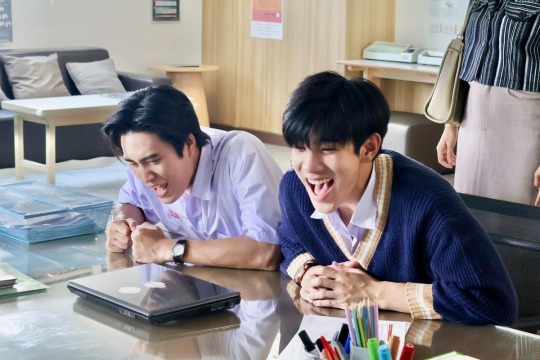

I'm glad he trusts kongthap enough to confess his fears to him, and that kongthap takes him seriously and tries to understand where he's coming from.


Glad the show didn't go the homophobic teacher route implied in the preview last week, and instead gave us two queer elders guiding atom and kongthap on their journey ❤️
I liked the analogy that Annop gave of different kinds of love and the chocolate cakes :') it was a gentle way of unravelling atom's genuine fears of their relationship being "different from other people's" and the way he's more afraid of how people will look at kongthap in a negative light than what people think of him, and that just goes to show how selfless he actually is, deep down.


Annop acknowledges the difference of the love atom was talking about, but he also says that even tho they may be different in form and shape and how people express them, essentially they are still love, and Atom shouldn't judge himself so harshly for his feelings. He shouldn't bow down to other people's perception of him and kongthap and end up hurting them both.


Also, I've seen a strange criticism of the musical performances in MLMU being "too overdramatic / cringe / OOC" from mostly US American / western bloggers here, and I just wanted to say, please chill out 😂 musical segments are pretty common in south Asian / SEA media/ storytelling in general. If you've seen any Indian/bollywood films ever in your life, chances are that, you'll see at least 2 songs and 1 dance and all of them are meant to be taken FICTIONALLY, with suspension of disbelief and not literally assumed that the characters breaking into song and dance are seasoned performers or what not. The music and dance segment IS a part of storytelling itself, meant to convey the mood of the characters, the emotions in the scene, in that segment of the story. So please cut atom and kongthap some slack lmao
I, for one, am thoroughly enjoying gemfourth's heavenly vocals and wish that peace on other viewers too :')
Also I'm loving how Gemini and Fourth as actors interpreted Ida and Aoki. In the jp version, personally, Ida felt a bit too stiff and robotic for me, I'm glad Gemini played kongthap as more of a soft, quiet boy who laughs, jokes around, and gets petty and silly at moments as he navigates his feelings. I also love how Fourth is playing Atom, giving him comedic beats and dramatic expressions but there's also a certain grounded, vulnerable core to him that comes out in heavier moments and absolutely punches me in the guts.
Overall, I'm genuinely enjoying seeing these 2 being dorks in love, navigating their big feelings and finding friendship and community in the people around them 🥺❤️
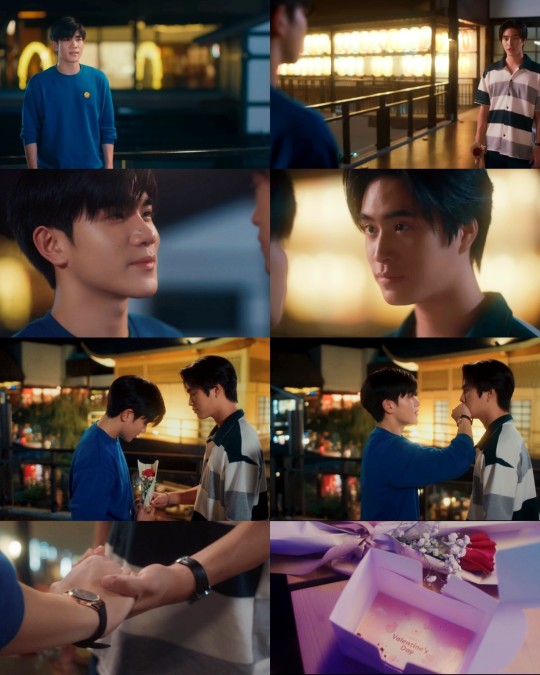
#my love mix up#My love mix up th#GeminiFourth#gemini norawit#fourth nattawat#This isn't very coherent bc I'm sleep deprived atm#But whatever#Just wanted to share my appreciation for this show ❤️#Gemfourth's acting is commendable as always#Loving the OSTs so far!!!#And we got a new colorist team from ep 5 onwards so hoping they'll fix the rest of the previous episodes too! :)
26 notes
·
View notes
Note
Hi. How are you? Hope everything's going well.
I want to share my thoughts on a scene from TBOC, episode 4. It didn't catch my attention the first time but rewatching it I was able to see it with different eyes. It gave me a little hope for Caryl's future and I think this fandom needs hope after Zabel's statements, so I decided to share it.
The scene is when Carol, Daryl, Didi and Theo are eating truffled eggs and Daryl asks for some of the truffles. Theo answers while looking at Daryl and then Carol "You need a good eye and a lot of patience. They're very hard to find"
I don't think for a second that this line is about truffles, it's all about Caryl
- "You need a good eye": Carol and Daryl can't see the love they feel for each other. And they also can't the love the other feels for them. Later in the episode we saw this when Carol react to the scene of Daryl saying "And I never ever stopped trying to get home to YOU" by saying "you loved her". She completely ignored what Daryl said to her and focused on something else. And as for the audience, well, we always need to see what's between the lines and that's why not everyone can see it.
- "And a lot of patience": Their relationship has been building very slowly and we've been here for 14 years..
- "They're very hard to find": Seeing a bond like theirs is something very rare, both in TV/movie and also in real life.
I think that at the end of the day we will have Caryl canon. It's heading towards that, even if at the moment we still have to interpret the scenes and interactions. And I think that when David Zabel says the things he says it's just to create a surprise element for when Caryl actually happens. It's not very clever, but I think that's what it is
Hi! Gosh, sorry I've taken an absolute lifetime to get back to you again. I wrote out a whole reply as soon as I saw your message, then went to bed, and then felt too disillusioned with the show and the twd fandom to really think much about it for a while. But I'm good, thank you! Hope you are too. ❤️
Thank you for sharing this! I can definitely see your take on this. I hadn't noticed this detail, and I enjoyed your interpretation of it. I'm struggling a bit because I'm finding that when I read takes on Zabel's writing or when I think about my own, the joy drains from me, because overall, I just don't understand what the leadership are trying to do with this show, or who they're making it for.
I did write out a whole thing because your message inspired a lot of thoughts, but I guess it sort of boils down to two main issues for me, which are:
1. Even if there is an intention (now or in the future) to deliver canon with Zabel, I don't expect it to be written well enough to be enjoyable or satisfying for most current caryl shippers or for people who don't ship them (yet??).
2. For me personally, even though I love caryl as a romantic ship (if done well), my biggest concerns about the future of the spinoff are how Melissa McBride and women generally are treated by it.
To elaborate on my second point, I know I can't presume to know what Melissa wants for herself, but nonetheless, the lack of equal billing, title, and writing hurt me and my enjoyment of the show. If I had to choose between those things and canon, I'd choose the former.
Overall, this means that I strongly feel that the only way for the spinoff to stop being harmful to women and to be enjoyable is with a new showrunner, unfortunately. And that means that personally, I can't enjoy anything about the show other than news of a change in leadership. I know that some agree and some don't, but for me personally, I feel like I gave David Zabel his chance for two seasons, and I'm really not enjoying what he's doing with the show, and that goes much further than my personal preferences for shipping and story choices.
I don't mean to undermine your positive take on the scene. I really appreciate you sharing your interpretation of it. I'm only responding with my less positive takes from it because I genuinely want the best for the show, the people involved in making it, and the fans. And I truly believe that being annoyingly persistent about the things that are less than OK (e.g. a showrunner who doesn't seem to know the source material, leadership who doesn't treat fans or female colleagues with respect, unequal billing, a problematic title, and shallow, misogynistic writing) is how to achieve that. Maybe we still won't achieve that, but I'm thinking a lot about what I choose to consume and support, and there is far too much going on here that I can't support with a clear conscience.
For me, even if, by some miracle, romantic canon is written well with Zabel as showrunner, I really can't enjoy the show while its title and billing lean into such harmful patriarchal messaging.
I still want to thank you. I think it's great to take whatever positives we can and to share them with each other - while also continuing to stand up for standards that should be improved. So, thank you for sending this positive take to me. One thing I have really appreciated in this fandom is the way so many come together to support each other and try to lift each other up during the difficult and less enjoyable parts. So, thank you for being a part of that. 💜
PS. Even though I deleted my original long reply to you, this reply has still ended up longgg. So, if you've read this far, wow, thank you. You deserve a break and a snack.
#but also bc this really bugged me at the time but why was daryl acting like he didn't know how to forage truffles??#isn't he mr crossbow-surviving-in-the-wild-would-definitely-know-how-to-forage-mushrooms-dixon?#twd caryl#the book of carol#tboc#ask
11 notes
·
View notes